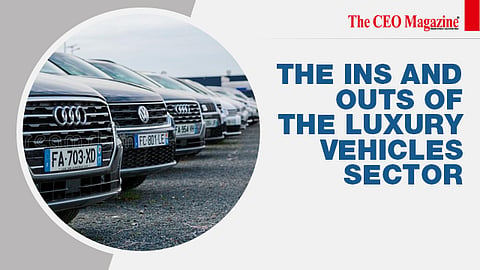
- News
- Women
- Magazine
- IndustryIndustry
- InsightsInsights
- Success Stories
- PublishPublish
- ContactContact
- Media KitMedia Kit

The Ins And Outs Of The Luxury Vehicles Sector
Luxury vehicles have always been a symbol of status and prestige. The sector encompasses high-end cars that come with advanced technology, superior performance, and unmatched comfort.
Over the years, the luxury vehicle market has witnessed significant growth as more and more people seek to own top-of-the-line cars. This article will provide an overview of the luxury vehicles sector, including its history, current trends, and future prospects.
The concept of luxury vehicles dates back to the early 1900s when wealthy individuals began commissioning custom-made cars from automakers. These cars were designed to offer superior comfort and style, and they quickly became a symbol of wealth and social status.
The luxury vehicle market saw rapid growth in the 1950s and 1960s when automakers such as Rolls-Royce and Bentley became household names. Since then, the luxury vehicle sector has evolved significantly, with new players such as Tesla and Porsche offering high-end electric and hybrid cars.
In recent years, the luxury vehicles sector has seen some notable trends. One of the biggest trends is the move towards electric and hybrid vehicles. Automakers are now focused on developing luxury electric cars that offer the same level of performance and comfort as their traditional gasoline-powered counterparts.
Another trend is incorporating advanced technology such as autonomous driving, AI-powered infotainment systems, and advanced safety features. These technologies are designed to offer a more personalised and safer driving experience.
In addition, there has been an increasing focus on sustainability and eco-friendliness in the luxury vehicles sector. Automakers are now using sustainable materials such as recycled plastics, wood, and aluminium to create their vehicles. Luxury electric cars are also seen as more environmentally friendly than traditional gasoline-powered cars.
The future looks bright for the luxury vehicles sector, with analysts predicting continued growth. The rising demand for high-end cars, coupled with advancements in technology, will drive the sector's growth.
In addition, the increasing focus on sustainability and eco-friendliness is likely to attract more customers who are conscious of the environment.
The luxury vehicles sector is also expected to see increased competition from new players. Startups such as Lucid Motors and Fisker Inc. are developing luxury electric cars that aim to compete with established brands.
These new players are likely to drive innovation and increase the range of options available to consumers.
The luxury vehicles sector has come a long way since its inception, and it continues to evolve with new advancements in technology and changing consumer preferences.
The sector's focus on sustainability and eco-friendliness is also likely to attract more customers who are conscious of the environment. As the demand for high-end cars continues to rise, the luxury vehicles sector is poised for continued growth and innovation.
Follow us on Google News
